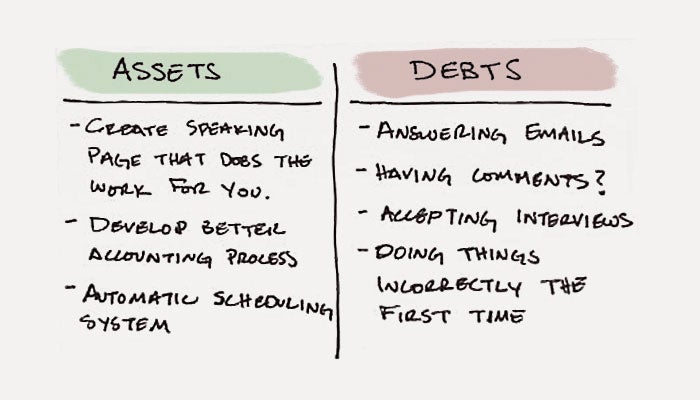Table of Contents
If there’s one thing the Internet isn’t short on, it’s long lists of productivity tips. No matter how many are out there, maximum productivity still seems elusive. People are beginning to think that maybe traditional time management isn’t the answer.
The main idea underlying new thought around time management is precisely that: maybe time management in the traditional sense isn’t the key to productivity after all.
According to organizational psychologist Adam Grant, time management actually hinders productivity. We need to shift our thinking from ‘how to get more done’ to ‘how to make sure we’re doing the right things.’ Instead of time management, he says, we should think about attention management:
“Being prolific is not about time management. There are a limited number of hours in the day, and focusing on time management just makes us more aware of how many of those hours we waste.”
With this and other modern productivity strategies in mind, here are six time management and productivity tips for marketers that you can leverage in 2019, and beyond.
6 Ideas From Current Productivity Thinking
1. Debts and Assets
Many experts recommend thinking in terms of debts and assets. When you’re tasked with something, analyze it in the context of whether it’s going to multiply your time (an asset) or cost you time in the future (a debt).
Sometimes you’ll see that more time now means less time later. Obviously, on some occasions, that means you’ll also have to reduce the time available for other tasks. As long as it won’t cost you significant time in the future, however, it’s not an issue.
2. Reverse-Engineer
Instead of planning out your day in the traditional manner, consider reverse-engineering it according to the highest-priority tasks. Stop saying, “I have a task; where should it fit in my day?” and start thinking, “This is my day; does this task deserve priority?” The understanding here is that you don’t have unlimited time, and only a fraction of your to-list deserves your attention.
3. Take a Holistic Approach
As work/life boundaries blur, many people can no longer leave their “tasks” at the office door. It can be tempting to try to carry tasks over into the personal realm. And it’s all too common to feel pressure to be as productive at home as we are in our work lives.
Being productive all the time, however, leaves you at serious risk for burnout. That’s why it’s essential to schedule downtime, rest, and exercise into your productivity, as opposed to them being something you fit in when your productive time is over.
4. Simplify Your Life
Regardless of what approach you take to productivity and time management, it’s essential to strip your days off all unnecessary tasks. We’ll talk about delegation in a minute, but in general, what you can’t delegate, automate.
Take another look at the ‘Debts and Assets’ graphic above. Automating is considered an asset because, although it may take some extra time to set up, it’s likely to save significant time in the future.
Here are a few other simplifying tips:
- Forget your passwords
How much time do you spend each day trying to remember, look for, or reset forgotten passwords? For many people, the answer is too much. By using a password manager like 1Password or LastPass, you’ll only ever have to remember one password.
- Let your emails send themselves
Tools like Mailshake and Right Inbox are a massive time-saver for marketers of all stripes. Use them to send emails later, get automatic reminders, and send primary email sequences.
- Simplify contracts
There are plenty of signature tools like Eversign that allow you to sign contracts and fill in forms online. This will save you the time you would normally spend printing something out, signing it, scanning it, and sending it again — and you’ll save a few trees in the process.
These are some great examples of small things you can do now that will yield big-time savings in the long run.
5. Use the Right Method
If you decide to go with a traditional time management method, make sure you shop around to find one that’s right for your personality. Take a quick trip through the most important — GTD, Pomodoro, Kanban, 10-minute rule — and make a schedule to try them out. Different personalities are drawn to different methods. It really doesn’t matter which one you choose. Just make sure you feel comfortable with it and that your natural workflow isn’t interrupted by buzzing alarms or arbitrary time limits.
6. Delegate
Whatever else you do, learn to master delegation. It’s a skill, unlike any other, and one that could save you serious time and energy.
1. They Don’t Choose the Right Person to Delegate To
Whatever else you do, learn to master delegation. It’s a skill, unlike any other, and one that could save you serious time and energy.
If delegating doesn’t come easy, you can absolutely improve with practice. Most people who find delegation awkward encounter two specific problems:
2. They Don’t Give Detailed Enough Instructions
Again, when something is second nature to you, you might presume that everyone will find it as readily understandable as you do. This means you may end up explaining tasks insufficiently. Nobody can do a job well without proper instruction. So if you don’t have a brief ready to go, take the time to draft a decent one before you start delegating.

Quick Productivity Fixes
Whatever else you do, learn to master delegation. It’s a skill, unlike any other, and one that could save you serious time and energy.
If delegating doesn’t come easy, you can absolutely improve with practice. Most people who find delegation awkward encounter two specific problems:
- Plan your week — Beginning your week with a plan, a priority, and a roadmap starts you off on the right foot with a clear agenda.
- Put a time limit on tasks — Some tasks (or even breaks) are notorious time sucks. Set a time limit on things that tend to get out of hand. Use an audible reminder if necessary.
- State desired results from meetings — Meetings can be black holes for productivity. Start each one by stating the desired results and implementing as many meeting management tips as possible.
- Eat the frog — You’ve probably heard this funny-sounding productivity tip before, but it’s a good one. Simply put, get the most critical and potentially least attractive item on your to-do list done first.
- Done, not perfect — The bottom line is that by waiting for something to be perfect, you risk not getting it done at all. At the very least, you’re wasting valuable time – yours, and potentially other people’s. Remember, you can always polish things up at a later stage.
- Inspiration isn’t your friend — Many tasks, especially creative ones, are significantly delayed by people waiting for inspiration to strike. Apart from the fact that inspiration may never strike (and you’ll have to do the task anyway), waiting can put you in a rut. Instead, take your “inspiration” from point #5 above, and just get it done.
Moving Forward
If you’re a marketer looking to become more productive, there’s no lack of suggestions out there. There are literally hundreds of tips available online, all aiming to help you squeeze more into your already-packed day.
But while some of them may well give you a sense of productivity, if you’re productively doing things you shouldn’t be doing, or being so productive that you’re neglecting your health or family, then you’re not as successful as you might think you are.
Instead, take a look at some of the newer thinking on productivity and the cult of “busyness.” You might come to some new conclusions about time management or even about what constitutes the “really important stuff” in your life and job.
By all means, use a few of the quick fixes to get through a busy day, but at some point, take a good hard look at what you’re doing, and see if it matches up with your “really important stuff.” If it doesn’t, then there are some more fundamental changes you might want to consider making.
How do you approach time management? What works best for you? Share your thoughts in the comments below.
Looking for fresh content?
By entering your email, you agree to receive Elementor emails, including marketing emails,
and agree to our Terms & Conditions and Privacy Policy.






